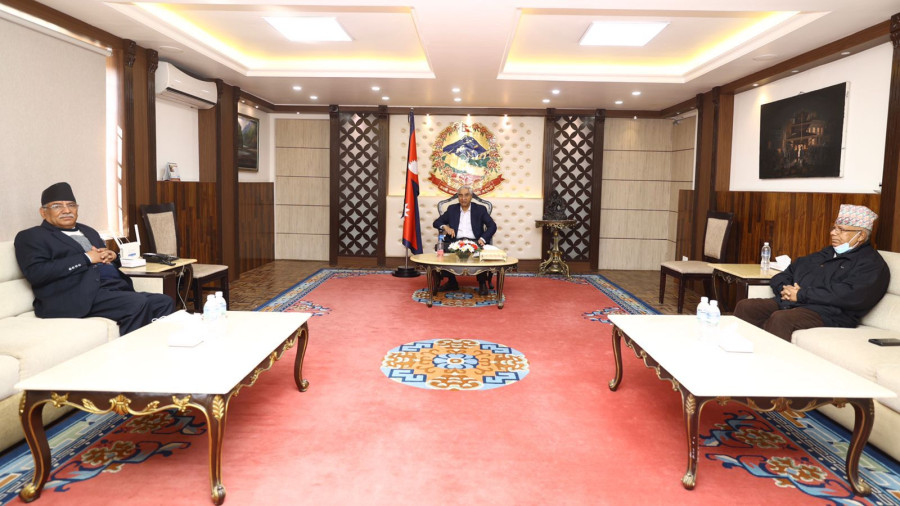National
Deepening rift over MCC among partners threatens the unity of ruling coalition
Maoist Centre sticks to its guns on the US compact as Deuba appears firm on tabling it for ratification.
Anil Giri
When KP Sharma Oli, chair of the CPN-UML, repeatedly called the current ruling alliance “unnatural”, it may have sounded like his rant against the parties that orchestrated his ouster from office. But within the ruling alliance also, partners were not quite convinced about the longevity of their unity.
All five partners in the alliance—Nepali Congress, Communist Party of Nepal (Maoist Centre), CPN (Unified Socialist), Janata Samajbadi Party and Rastriya Janamorcha—are parties that are poles apart ideologically.
But when they came together, they had a common cause. Oli as prime minister was dealing blows to the system and the constitution one after another.
Seven months after the coalition formed the government, there seem to a be serious rift. And the Millennium Challenge Corporation (MCC)-Nepal Compact, a $500 million US grant, appears set to drive the final nail in the coffin of the coalition.
After Washington’s warnings on Thursday in no uncertain terms—that it would review its Nepal policy should Nepali politicians fail to keep their commitments to ratifying the MCC compact by February 28, Prime Minister Sher Bahadur Deuba, Maoist chair Pushpa Kamal Dahal and CPN (Unified Socialist) chair Madhav Nepal held a meeting on Saturday at Baluwatar to find a way to move the MCC compact in Parliament for its ratification.
Sources said both Dahal and Nepal maintained their positions against the MCC compact and even questioned Deuba if he was working with the UML to unseat Speaker Agni Sapkota.
A Congress leader said the discomfort among coalition partners has grown and this was evident from suspicions raised by the two communist forces on many other issues, including the Congress party’s commitment to an electoral alliance and Deuba’s decision to announce local level polls on May 13 even as constitutional and legal questions remained.
“I sensed some unease brewing,” said the Congress leader. “It’s not just the MCC compact, the communist partners appear to be harbouring deep resentments on various other issues.”
The Deuba government decided to announce local level elections on May 13 despite Dahal and Nepal not wanting them so early. They were rather demanding parliamentary polls in April-May.
On Saturday, Deuba, Dahal and Nepal also discussed amendments to laws related to local level elections.
Govinda Bandi, a senior advocate who attended the meeting, told the Post that various aspects of constitutional and legal provisions related to local polls were discussed.
“Leaders expressed their concerns over whether local elections would be affected if electoral laws that contradict the constitution are not amended,” said Bandi. “Other contemporary issues were also discussed in the meeting.”
For Deuba, however, the MCC compact is of more significance than the local poll date, as it has been already announced.
Sources said Deuba told Dahal and Nepal that he intends to table the MCC compact in the House at Monday’s meeting.
“But both Dahal and Nepal rejected the idea,” said another Congress leader. “They instead proposed postponing the meeting at least by two days to Wednesday.”
It was not clear why exactly Dahal and Nepal wanted the deferral of the House meeting by two days, as given the complexities surrounding the MCC and their strong stance, a consensus is unlikely in the next four days.
Dahal is learnt to have proposed making a request to the Americans to grant six months to one year citing the approaching elections.
According to the Congress leader, Dahal is of the view that if the MCC compact is ratified now, the ruling alliance will break and the UML will benefit in the elections.
“Deuba told Dahal that the US is not going to entertain a further extension,” said the leader. “It’s us who sought four-five months as per which the Americans set the February 28 deadline. We have to fulfil our signed obligations.”
According to the Congress leader, Deuba also hinted that he may consider other options to ratify the MCC compact “because it is associated with the credibility of the country and failure to abide by our own commitments could invite serious geo-political complications”.
The meeting failed to find a common ground.
Dahal’s proposal of demanding another six months to one year, however, raises questions once again whether he has learned any lesson despite being badly exposed for his duplicity and double dealing.
The US has already made it clear that amendments to the MCC pact are not possible. Then what another six months or one year would mean when it comes to Dahal’s stance that the compact cannot be ratified in “its existing form”?
Since Deuba appears firm on ratifying the compact, Dahal seems to have sensed that the coalition is hanging by a thread.
In an interview with Ratopati, an online news portal, Dahal on Saturday said that he was “not in a position to say that the coalition won’t break”.
Narayan Kaji Shrestha, a senior Maoist leader, said that his party firmly believes that the coalition must continue.
“But we cannot make a compromise if the government tables the MCC compact for ratification,” Shrestha told the Post. “It will be better if the United States withdraws MCC from Nepal. Or its ratification should be put off for a year.”
According to Shrestha, the alliance may not remain intact if the prime minister moves the compact for ratification.
“There’s no doubt that we wish to give continuity to the alliance through the local polls and the other two elections,” said Shrestha. “But the day the prime minister decides to table the MCC compact in the House, we have to pull out of the alliance.”




 10.12°C Kathmandu
10.12°C Kathmandu















